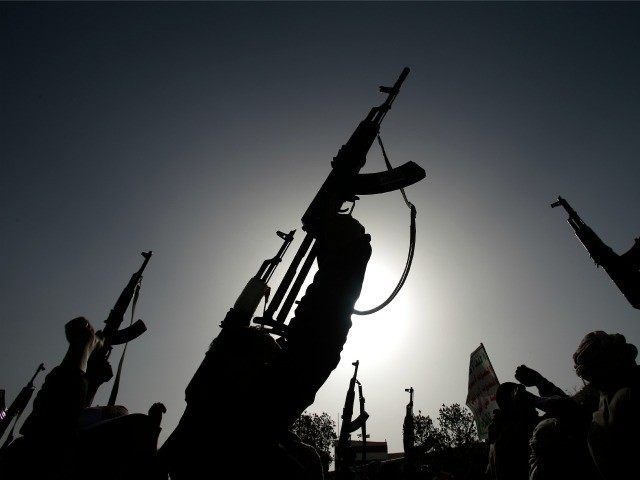The same Houthi rebels that President Joe Biden plans to officially remove from U.S. terrorist lists on Tuesday to allow more humanitarian assistance into Yemen are “diverting” aid for starving Yemenis, the State Department recently announced.
In a statement Friday, Secretary of State Antony Blinken announced that on Tuesday, the administration would officially reverse his predecessor’s 11th-hour move to list the Houthi group as a Foreign Terrorist Organization (FTO) and a Specially Designated Global Terrorist (SDGT). The FTO and SDGT labels carry severe U.S. sanctions.
The Houthi organization is a jihadist terrorist group allied with Iran, the world’s premier state sponsor of terrorism, which seized the capital of Yemen in 2015, prompting an ongoing civil war. The Houthis’ official motto is “God Is Great, Death to America, Death to Israel, a Curse on the Jews, Victory to Islam.”
Despite removing the Houthis, also known as Ansarallah, from U.S. terrorist lists, Secretary stressed in a statement Friday that his department remains:
…clear-eyed about Ansarallah’s malign actions, and aggression, including taking control of large areas of Yemen by force, attacking U.S. partners in the Gulf, kidnapping and torturing citizens of the United States and many of our allies, diverting humanitarian aid, brutally repressing Yemenis in areas they control … Ansarallah’s actions and intransigence prolong this conflict and exact serious humanitarian costs.
Houthi-controlled territory — where 80 percent of the Yemeni population facing famine, starvation, and diseases, lives — has reportedly forced international aid groups to work with the jihadis to deliver assistance.
“Agencies depend on the Houthis to deliver aid, and they pay salaries to Houthis to do so,” the Associated Press (AP) reported early this month.
In his statement acknowledging that Houthis are “diverting aid,” Blinken indicated that the primary purpose of removing the Iran-backed group from the U.S. terrorist lists is to allow more international aid to reach Yemenis across the country. As reports indicate that the Houthis profit off of any aid that reaches Yemenis, there is a high risk that they would also profit from any American aid.
Blinken declared:
This decision [to revoke the Houthis’ terrorist label] is a recognition of the dire humanitarian situation in Yemen. We have listened to warnings from the United Nations, humanitarian groups, and bipartisan members of Congress, among others, that the designations could have a devastating impact on Yemenis’ access to basic commodities like food and fuel.
The revocations are intended to ensure that relevant U.S. policies do not impede assistance to those already suffering what has been called the world’s worst humanitarian crisis.
Human Rights Watch (HRW) accused the Houthis in September 2020 of having “a particularly egregious record of obstructing aid agencies from reaching civilians in need, at least in part to divert aid to Houthi officials, their supporters, and Houthi fighters.”
Nevertheless, the Biden administration and some aid groups are concerned that Trump’s branding of the Houthis as terrorists, a move that went into effect a day before Biden’s inauguration, would limit aid to Yemen, including areas controlled by the Iran-backed group.
U.S. taxpayers and American Non-Governmental Organizations (NGOs) have already provided more than $1 billion of humanitarian assistance to Yemen since 2019 alone.
Iran-backed Houthi rebels are known to engage in reprehensible acts against civilians, including attacking and torturing U.S. citizens, Blinken noted. Still, some aid groups have welcomed Biden’s move to rescind the Houthis’ designation as terrorists.
David Miliband, the head of the U.S.-based International Rescue Committee (IRC), an NGO, complained that the Trump policy “would only hinder much-needed aid deliveries to Yemenis living in Houthi-held areas.”
In contrast, Muna Luqman, the head of the NGO Food4Humanity, an NGO, lambasted international aid groups for partnering with bodies affiliated with the Houthis, noting that the United Nations had also been too soft on the Iran-allied group, Al Jazeera reported last September.
According to Blinken, Houthi leaders already on the Department of Treasury’s list of Specially Designated Nationals and Blocked Persons (SDN) for threatening the peace, security, or stability of Yemen would remain sanctioned.
Secretary Blinken explained:
We will continue to closely monitor the activities of Ansarallah and its leaders and are actively identifying additional targets for designation, especially those responsible for explosive boat attacks against commercial shipping in the Red Sea and UAV [Unmanned Aerial Vehicle or drone] and missile attacks into Saudi Arabia.
The United States will also continue to support the implementation of United Nations sanctions imposed on members of Ansaralla and continue to call attention to the group’s destabilizing activity and pressure the group to change its behavior.
After announcing the State’s intent to remove the Shiite Houthis’ from its list of terrorist organizations on February 4, the Biden administration condemned the Iran-backed group for attacking a civilian airliner in Sunni Saudi Arabia. Some of the Houthi-controlled land in Yemen borders Saudi Arabia, which launched a Sunni-coalition offensive in March 2015 against the Shiite group that had taken the Yemeni capital of Sana’a in late 2014.
On February 4, Biden announced an end to U.S. military support, namely intelligence and logistical assistance and weapons sale, for the Saudi Arabia-led Sunni coalition.
The Saudi coalition has been fighting to restore the internationally recognized Hadi government.

COMMENTS
Please let us know if you're having issues with commenting.